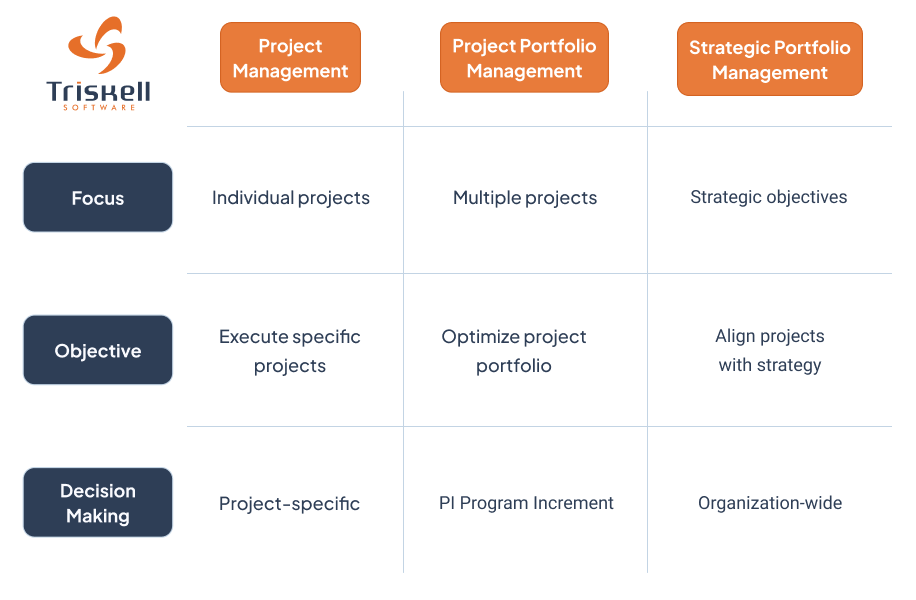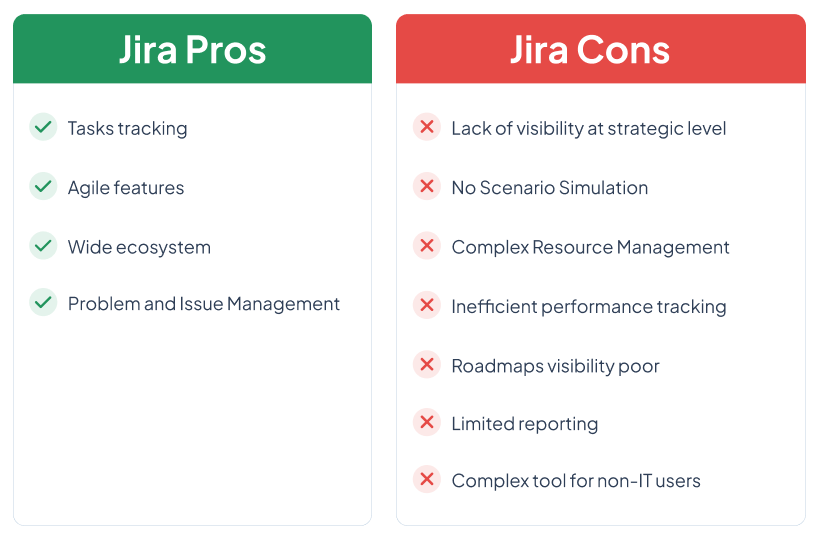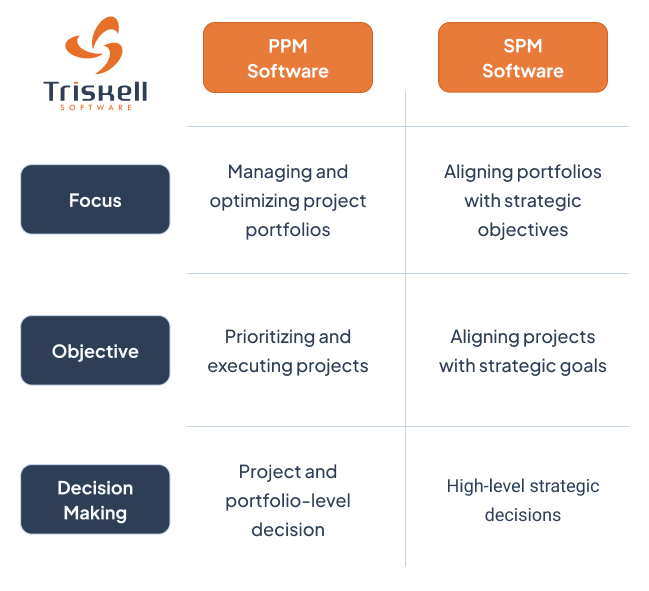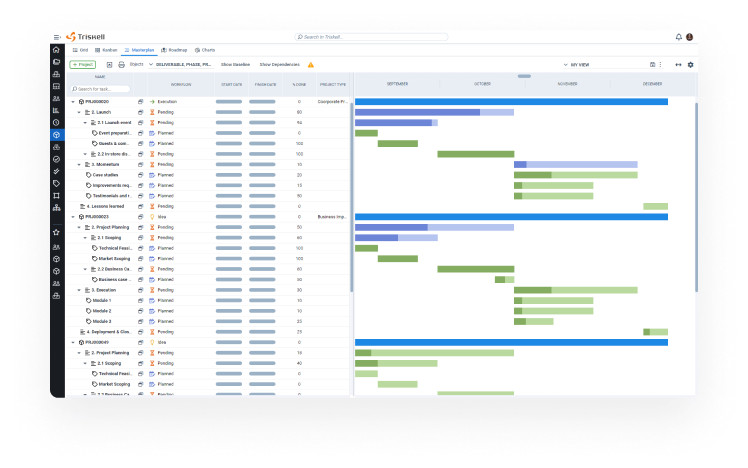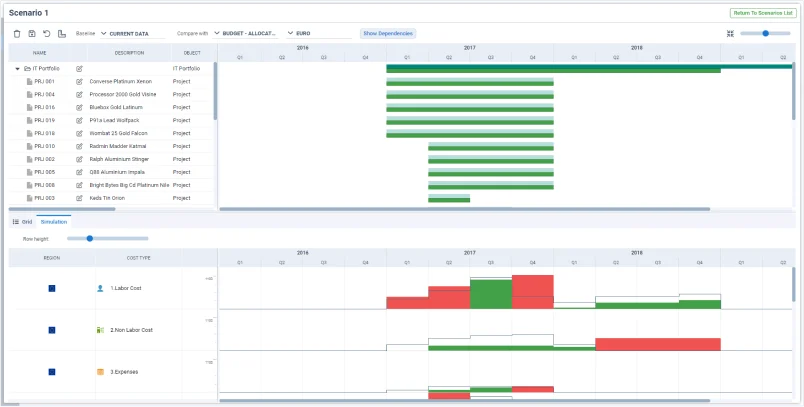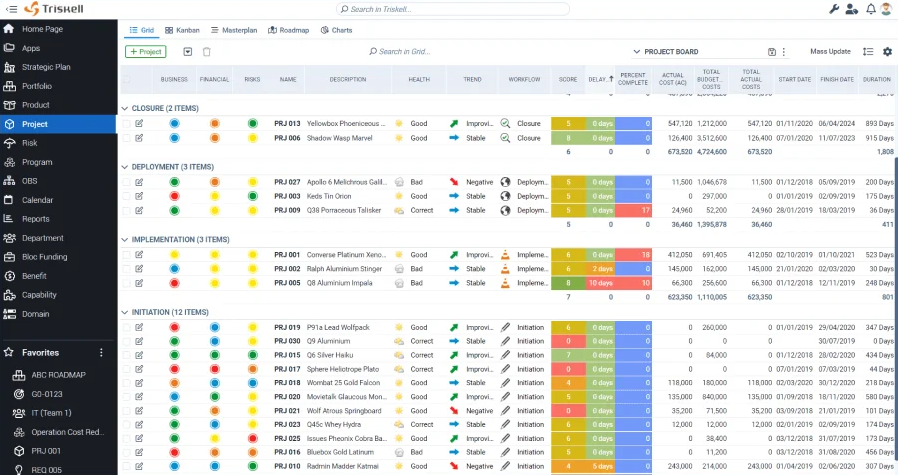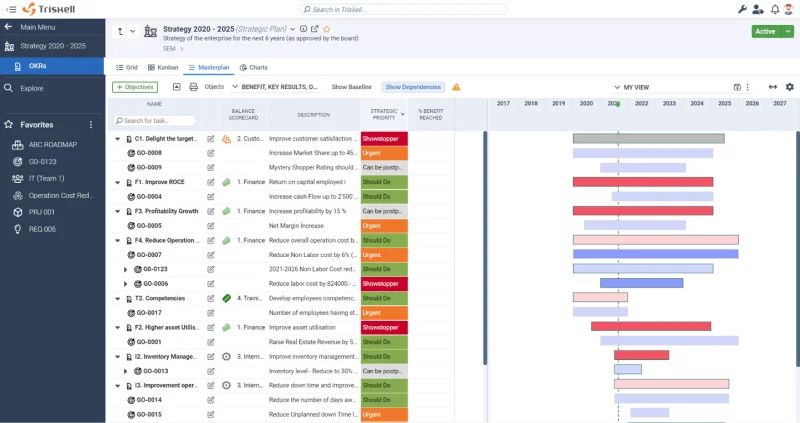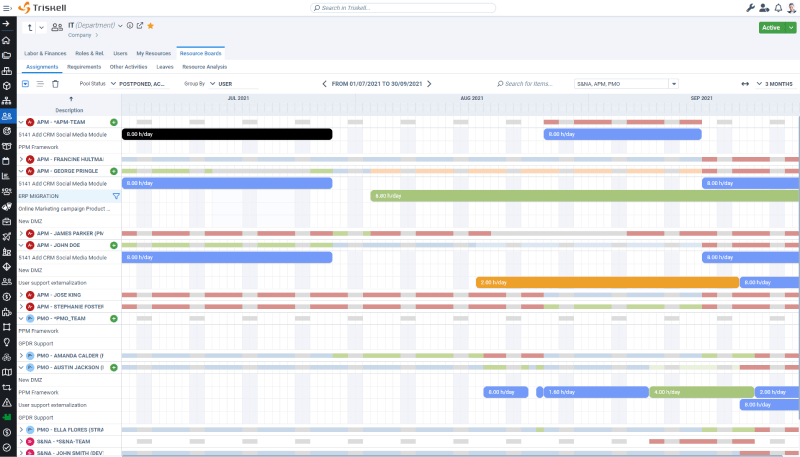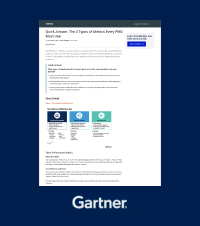Jira vs Triskell: what's the best option for Project Portfolio Management?
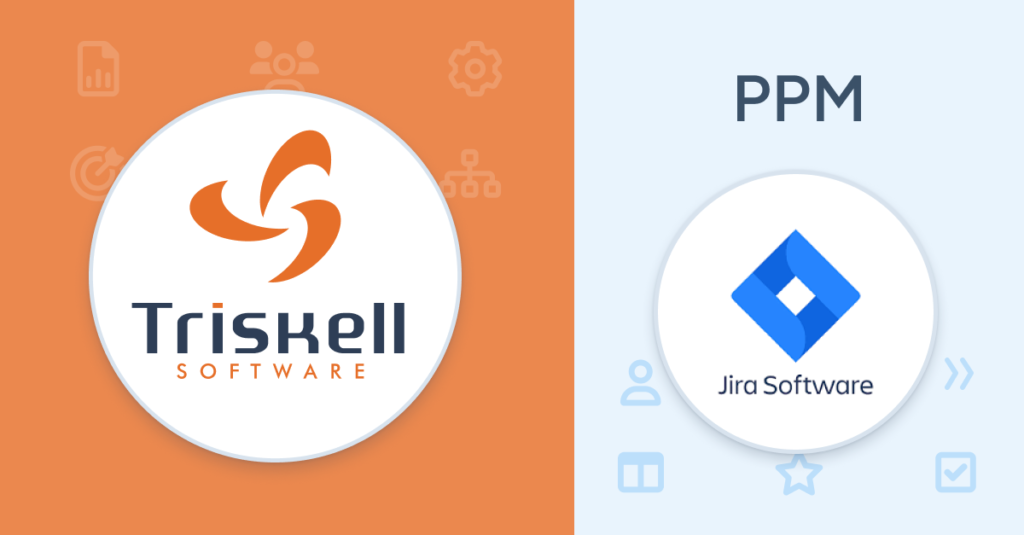
In the field of project and portfolio management, the choice of the right tools is crucial. Jira is undoubtedly one of the most widely used solutions in medium and large companies, but is Jira the best alternative for portfolio management?
In this article, we will explore why Triskell Software presents itself as a solid alternative to Jira. We will discover their strengths and compare their functionalities to help you make an informed decision about managing your portfolio.
TABLE OF CONTENTS
Understanding the PPM market landscape: Jira vs Triskell
Project portfolio management is a discipline that has been constantly evolving over the last 20 years. And, in parallel, the solutions used by organizations have also been changing.
In fact, we can distinguish 3 groups of tools:
- Project Management software: is a tool designed to plan, execute and monitor individual projects, facilitating resource allocation, task tracking and team communication. It helps to ensure that projects are completed within the defined deadlines and requirements.
- Project Portfolio Management software: PPM software is used to manage multiple projects and, depending on the size of the organization, several portfolios of projects or products. They also have functionalities to assess the strategic alignment of each initiative with the company’s objectives, prioritize investments and optimize resources to achieve a correct performance of each portfolio.
- Strategic Portfolio Management software: is an evolution of traditional PPM software, which focuses on aligning projects with the company’s overall strategy. They allow the constant evaluation of projects in terms of the strategic value they bring and thus ensure that each portfolio contributes to the long-term mission and vision of the organization.
See the Triskell platform in action in a personal demo
Jira, the leading representative of the project management software industry
Jira is definitely one of the most popular project management solutions thanks to its versatility and adaptability to solve the challenges and obstacles faced by IT and Development teams when managing their initiatives. It is based on the tracking of incidents and tasks, and its entire operation revolves around the concept of ‘issue’, which is used to represent individual work models.
Jira’s dashboards, workflows and all the customization options it offers help to meet the dynamic needs of project teams, allowing them to iterate quickly and respond to changes.
Jira meets the dynamic needs of project Teams, allowing them to iterate and respond to changes quickly
Triskell Software: strategy planning and execution in one place
However, as organizations expand and their projects increase in number or become more complex, project management-centric software is not enough. Jira can present challenges in areas such as strategic alignment, scenario planning and resource management, which it is unable to address.
To do this, companies need to have a PPM software with functionalities with which they can plan their strategy and align the different initiatives with the objectives of the organization. And this is where Triskell Software stands out.
Triskell adopts a holistic approach to project portfolio management. Designed to address the complexities of today’s business landscape, Triskell not only allows you to manage multiple project portfolios but brings strategic insights to all PPM processes. Something that Jira cannot accomplish for the reasons we will explain below.
Triskell brings strategic insights to all Project Portfolio Management processes
Why Jira is not the best alternative for Project Portfolio Management?
While you can use add-ons such as Jira Align or Portfolio Management in the Jira ecosystem to provide you with visibility at the Portfolio and strategy level, you will not get the 360° view that Triskell provides.
This is the main challenge that Jira has yet to solve: it does not provide visibility at a strategic level. This means that this solution presents, at the Portfolio level, a series of unresolved shortcomings that make it difficult for organizations to make informed decisions and to link each initiative to strategic value.
Some of the main challenges that organizations face with Jira include the following.
1. Lack of visibility at the strategic level
As organizations are required to handle a growing number of projects, the lack of holistic and strategic vision and planning of project portfolios becomes a problem for all Jira users. With Jira, it is not possible to align initiatives with strategic objectives, nor does it provide tangible data on the value that each project brings to the business.
2. Inability to simulate scenarios
With Jira, Simulation and Scenario Analysis is not possible. This will make it difficult to plan in advance the impact of possible changes or misalignments in project portfolios or long-term objectives. In addition, decision making will be hampered, as Jira does not provide clear visibility into the possible outcomes of each scenario.
3. Complex resource management
Again, since Jira is a project management focused solution, as project portfolios grow and resources need to be allocated across multiple projects, it is a rather poor tool at this point. In addition, resource tracking must be done manually, with time-consuming actions. And it does not allow linking Resource Management with Strategic Planning, so you will not be able to know if key resources are allocated to the most important projects for the organization.
4. Poor monitoring of portfolio performance
With Jira you do not have a global view of the performance of projects and portfolios to which they belong. This will make it difficult to identify bottlenecks, risks and areas for improvement, so your continuous improvement processes will not be as efficient as they could be.
5. Roadmaps with much room for improvement
Unlike most Project Portfolio Management solutions, with Jira it is very complex to create and share dynamic project roadmaps that are visually appealing and effectively communicate project progress and planning.
See the Triskell platform in action in a personal demo
6. Limited reporting
While Jira offers quite interesting reporting features at the project and team level, it falls far short of providing good high-level reports that give an overall view of project portfolios. In order to make strategic decisions, you need information on how each individual project contributes to the achievement of long-term business objectives. And, unfortunately, Jira does not provide this visibility across projects.
7. Complex tool for non-IT users
And finally, let’s focus on Jira’s interface. Although the UI of the software has been evolving over the last few years to meet the needs of IT and Development teams, these changes are still not enough.
Why? Precisely for that reason: because it is designed for high technical profiles. In the context of Project Portfolio Management, many non-technical profiles are involved, such as company executives, project sponsors, Product Managers or Business Analysts. For all of them, the complexity of Jira can make collaboration and communication, visibility of project portfolios or decision making difficult.
Jira´s complexity for non-IT users can make collaboration, communication and decision-making difficult
Why Triskell is the best alternative to Jira?
Now that you have an overview of why Jira is not a good choice for managing multiple project portfolios, what remains to be clarified is: why Triskell? What makes it different from other PPM solutions on the market?
As we explained at the beginning of the post, there are 2 types of tools that organizations can use to manage their project portfolios:
- PPM software, which are designed to manage aspects of Project Portfolio Management such as project prioritization, resources, budgeting or costs for each project portfolio.
- SPM software (Strategic Portfolio Management): these are an evolution of the previous ones, which add functionalities that allow linking the business objectives with the different initiatives of the organization. All PPM processes are linked in one way or another to the company’s mission and vision.
Why your IT department needs an integrated SPM & PPM solution?
Triskell Software belongs to the latter group. With Triskell’s platform solutions, organizations can capture, align and link their projects, programs and portfolios to business objectives and improve overall business performance.
These are the main strengths on which Triskell stands as the best alternative to Jira:
1. Comprehensive planning of project portfolios
One of Triskell’s main strengths is its ability to plan multiple project portfolios. Unlike Jira, which focuses on individual projects, with Triskell you will be able to analyze project portfolios from a high-level strategic perspective.
This visibility will enable executives, PMOs, product managers and other stakeholders to assess the alignment of each initiative with business objectives, and thus ensure that they contribute directly to the success of the organization.
With Triskell you can analyze project portfolios performance from a high-level strategic perspective
2. Strategic alignment of projects
Triskell puts special emphasis on project alignment. Thanks to the functionalities of its PPM platform you will be able to prioritize projects according to their potential impact on business objectives.
This will not only keep your teams focused on the initiatives that will really add value to the business but will also improve your decision-making processes when it comes to allocating the right resources and funds to each initiative.
3. Improved strategic decision making
And, for better decision making, Triskell has many functionalities that will facilitate decision making in your organization at a strategic level, such as:
- Scenario analysis and simulation.
- Scoring models.
- Master Plans and Roadmaps.
- OKR.
- Capacity planning capabilities.
While Jira requires additional plugins or configurations for minimally informed decision making, Triskell’s solution is designed with a special focus on strategic planning, initiative prioritization, resource management and budget tracking.
4. Scalability and flexibility
Unlike Jira, which is very rigid when it comes to managing multiple project portfolios, Triskell is designed to meet the challenges of large and complex project portfolios.
Its scalability and flexibility ensure that as your organization and its goals evolve, you can easily adapt Triskell to a larger volume of projects or to different Project Management frameworks. You won’t need the help of a developer to change the configuration of the platform.
As your organization evolves, you can customize Triskell to your changing business need
5. Advanced reporting and analytics
Triskell’s reports and dashboards go beyond simple real-time monitoring of project status and performance. With Triskell you get advanced analytics at the project, program and portfolio level, so stakeholders can identify potential risks, make data-driven decisions and take proactive measures to align projects with objectives.
Ultimately, Triskell’s reports will provide you with the visibility you need for effective portfolio decision-making and strategic planning.
Triskell vs Jira: comparison of features
Now that you know the strengths of Triskell compared to Jira, let’s make a detailed comparison of the features of Triskell and Jira. This analysis will allow you to understand in depth the capabilities, advantages and limitations of both platforms, and help you make an informed decision on which is the most suitable solution for managing project portfolios in your organization.
Triskell’s outstanding features
If Triskell has managed to position itself as one of the most solid PPM solutions in the market, it is because of the visibility that its users get at portfolio level thanks to its functionalities. These not only successfully address the daily challenges and issues of PPM management, but also offer additional advantages that can make a difference in the efficiency and success of your PMO or project teams.
Among Triskell’s most outstanding functionalities we highlight the following:
See the Triskell platform in action in a personal demo
What-if Scenario Analysis
- With Triskell you can model different scenarios and see their potential impact on project portfolios.
- You can assess how changes in resources, timelines or project priorities affect the overall performance of portfolios.
- Make more informed decisions, assess risks and adapt strategy execution based on real-time data.
Balanced Scorecards
- Triskell scorecards provide a consolidated view of project portfolio health and performance.
- You can monitor the KPIs of several projects and initiatives. You’ll be able to identify areas for improvement, monitor progress and detect those projects that need attention.
- You will obtain real-time insights into the alignment of portfolios with strategic objectives.
Master Plans and Roadmaps
- With Triskell you can create dynamic and interactive Master Plans and Roadmaps that will clearly show the planning and status of each project or program.
- They will give you a holistic view of the strategic path of project portfolios, making it easier for you to coordinate and understand the priorities of each project.
Resource Management
- With Triskell you will get a complete view of Resource Management, ensuring that resources are allocated efficiently according to skills, availability and demands of each project.
- Align resource capacity, demand management, ongoing activities and business strategy to maximize the performance of your human assets.
Jira vs Triskell: comparison of functionalities for Portfolio Management
And now, let’s compare one by one the functionalities of Triskell with those of Jira, so you can get an exact idea of what the capabilities of both tools are.
Functionality |
Jira |
Triskell |
|---|---|---|
|
Visibility at portoflio level
|
|
|
|
Product roadmapping
|
|
|
|
Portfolio Management
|
|
|
|
Product lifecycle management
|
|
|
|
Capacity planning
|
|
|
|
Multi-portfolio management
|
|
|
|
Balanced Scorecards
|
|
|
|
Scenario Analysis
|
|
|
|
Demand Management
|
|
|
|
OKR Management
|
|
|
|
Strategic portfolio analysis
|
|
|
|
Resource Management
|
|
|
|
Project & Program Management
|
|
|
|
Portfolio planning and prioritization
|
|
|
|
Financial portfolio management
|
|
|
|
Project scoring
|
|
|
Conclusion: Triskell, your path to seamless PPM beyond Jira
To summarize, when it comes to project portfolio management, it is essential to make informed and strategic decisions. And in this regard, Triskell is positioned as the best alternative to Jira thanks to its wide range of functionalities specifically designed to address the challenges of large-scale project management.
And you know what? You don’t have to choose between one or the other. Triskell has out-of-the-box integration with Jira, which will give you a unified view of your organization’s entire project ecosystem.
- If you have several departments in your organization that use different instances of Jira, with Triskell you will be able to connect to all of them.
- This integration is also automatable. That is, certain actions performed in Triskell can be automated so that the information is automatically replicated in Jira and vice versa.
In short, if you are looking for a solid and versatile option to carry out a smooth portfolio management, Triskell is the ideal choice. It is not only an alternative to Jira, but also a strategic ally to take your project management to the next level.
Subscribe to our Newsletter
Get stories like this in your inbox
Request a demo of Triskell Software
Triskell Software is the flexible solution you need to drive your organization’s portfolio management to excellence. Check it out for yourself by requesting a demo below.
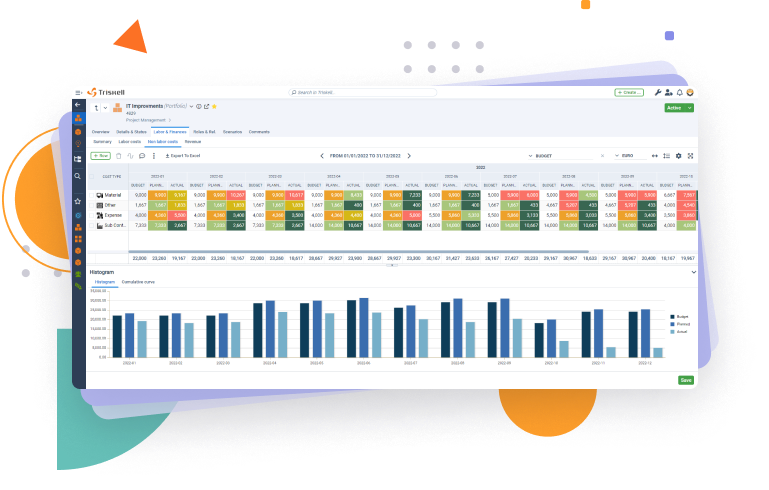
Related Content

CAPEX vs OPEX: strategies for managing budgeting in IT Projects
Learn about the impact of CAPEX and OPEX on IT project budgeting and discover best practices to manage them effectively in this guide.

The ultimate PMO guide: roles, responsibilities and best practices for successful implementation
Learn everything about PMOs: roles, responsibilities, and best practices for successful implementation. A must-read guide for project managers..
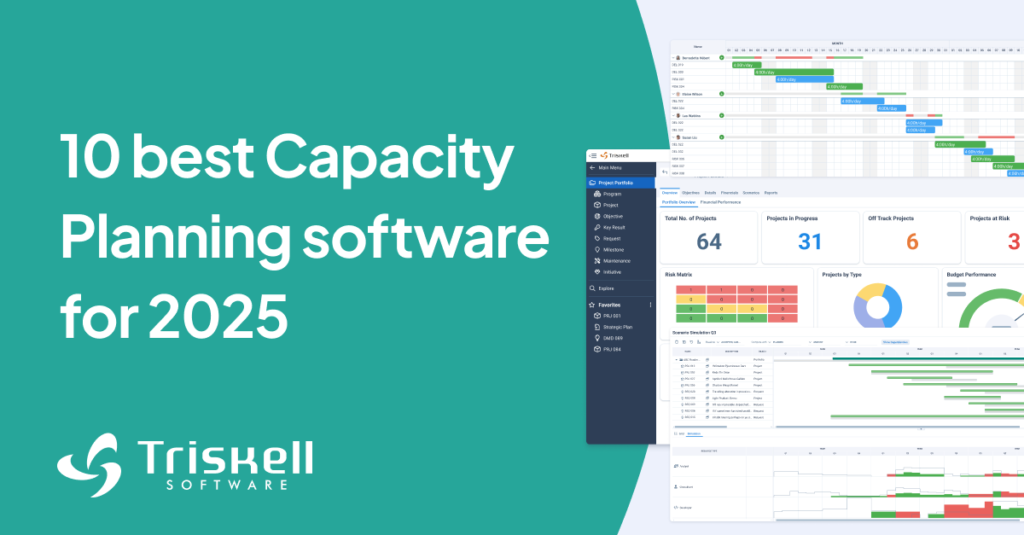
10 best Capacity Planning software & tools in 2025: the ultimate guide
Explore the top 10 capacity planning software and tools for PPM. Compare features, pricing, and find your best fit for your business.
